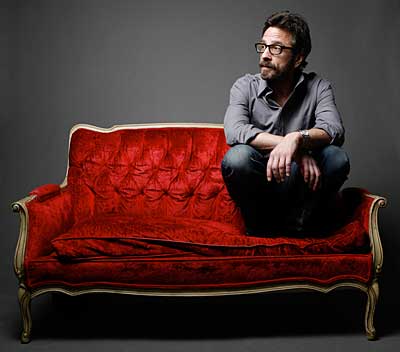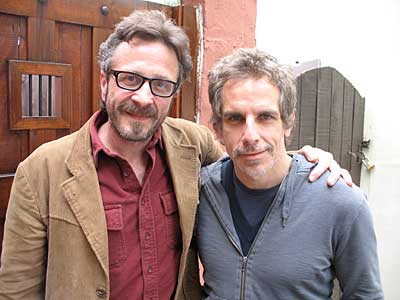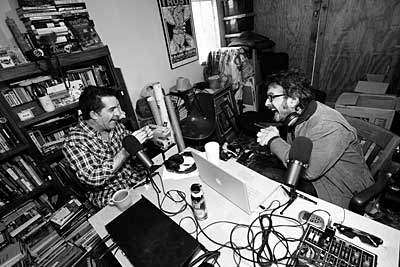WTF Is Marc Maron Up To?
"I'm still just a guy sitting at home, trying to keep up with my life, figuring out what the hell I'm going to say when I get in the garage," says comedian Marc Maron.
Sometimes good things come from desperation. Sometimes you get a break exactly when you need one. And sometimes, when you're at the end of your rope, a trampoline shows up beneath you.
In September, 2009, Marc Maron was at the end of his rope. While he was a well-known comedian, thanks to many late-night talk show and cable TV appearances, his career was drying up. He couldn't find an audience for his caustic brand of standup, and his on-air job with Air America, the liberal talk station, had ended. With no other options besides changing careers, he decided to try podcasting. It turned out to be one of the best decisions of his life.
"I knew that Jimmy Pardo did a podcast and Jim Dore was doing a podcast," says Maron. "I knew the format was out there and we had our security cards, and [Air America] hadn't kicked us off the premises, so we just started going up in the studio after hours with the security cards and bringing guests up on the freight elevator, and those first 12 were done in that way."
Maron called his podcast WTF, and relied on his address book of famous friends for guests. Early shows saw him interviewing Jeff Ross, Patton Oswalt, David Cross, and Caroline Rhea. He posted two shows, which include long sit-down interviews, each week.
 "It burst out of the mixture of desperation and proximity to equipment, and the Air America executives were too dumb to kick us out of the building," says Maron.
"It burst out of the mixture of desperation and proximity to equipment, and the Air America executives were too dumb to kick us out of the building," says Maron.
Dealing with the aftermath of a messy divorce and a dissolving career, Maron threw himself into WTF like a man with nothing left to lose.
"My manager had lost faith in me and really stopped working for me. I had no representation," Maron says. "I didn't know what the future held. I managed to hold onto my house in Los Angeles, but that's about it."
Right from the start, the reaction to WTF was strong, there was a buzz about it. As Maron continued to turn in one compelling comedy interview after another, doing his podcast became a must for anyone in the standup world. The number of listeners picked up.
"It really grew exponentially around certain episodes," says Maron. "The first episodes did very well, but really the explosion started to happen when -- it already had a steady build, but Robin Williams, that interview sort of put it on the map in a large way. Ben Stiller was a big interview, and the Louis CK interview, the Judd Apatow interview. As those guests came around we were able to bring in a lot of different listeners."
The Digital Confessional
The A-list guests are part of the reason for WTF's success, but the majority of the credit goes to Maron himself, and the relationship he creates with his subjects. After the early shows recorded at Air America's studios, Maron moved the show to his home in Los Angeles -- to his garage, more specifically. Most shows are animated, surprisingly intimate conversations held in Maron's unkempt garage. And it works.
 Somehow, the combination of domestic mess and isolation gives Maron the perfect setting to get deep with his guests, to bring up thoughts that many of them probably haven't shared in interviews. Maron doesn't only ask questions: he adds his own stories. The results are some of the funniest therapy sessions ever recorded.
Somehow, the combination of domestic mess and isolation gives Maron the perfect setting to get deep with his guests, to bring up thoughts that many of them probably haven't shared in interviews. Maron doesn't only ask questions: he adds his own stories. The results are some of the funniest therapy sessions ever recorded.
"I'm pretty upfront in where I'm at in my emotions and I really seek to engage emotionally with people in general," says Maron. "I offer up a bit of myself and they will lead me where they're confortable. It does get candid. And also, the nature of the garage and the idea that -- I don't know how long it'll last now that there seems to be more attention on it -- but there's something incredibly informal about walking through a guy's kitchen into his garage and sitting amongst his books and clutter.
"The coziness and the informality of the situation coupled with my need to connect on a relatively deep level with people in general is how that happens," he adds.
Having spent a lifetime in comedy clubs, Maron often has a history with his guests. The stories that come up aren't always flattering to him. Amy Poehler and Dmitri Martin, for example, both told stories from their early careers when Maron had slighted them on stage. For Maron, coming clean is all part of the process.
"I don't think I'm hiding the fact that I was a bit of a douchebag. I don't know why I would hide it. If anything, the podcast is about owning who you are, for better or for worse, for me, anyway, and kind of moving through that," says Maron. "There was a good chunk of time where I was a pretty dickish, defensive, insecure guy."
More than a job, the podcast has become a tool for self-improvement. "There's a certain element of me -- from the beginning to the 200th episode -- evolving and trying to change and be part of my community and be a better person," he says.
A Comedy Podcast Boom
Maron isn't working in a vacuum -- several talented comics have lately started their own podcasts, perhaps some inspired by his success. Podcasting and comics, it seems, are a perfect fit.
 "It just became this great medium," explains Maron. "Comedians are people that have a lot of time to sit and think about stuff. Their job is to process things through a certain lens. They're all a bunch of pretty deep thinkers, at least social commentators and observers. Some of them tend to more theatrical things with sketch and everything else. Some are just commentating on life, but these are people who spend their life talking into a microphone, so the transition makes perfect sense to me."
"It just became this great medium," explains Maron. "Comedians are people that have a lot of time to sit and think about stuff. Their job is to process things through a certain lens. They're all a bunch of pretty deep thinkers, at least social commentators and observers. Some of them tend to more theatrical things with sketch and everything else. Some are just commentating on life, but these are people who spend their life talking into a microphone, so the transition makes perfect sense to me."
For his part, Maron appreciates the complete openness that podcasting offers: there are no bosses or agents or ratings to worry about.
"It's a free stage. You're not even restricted by waiting for laughs," he says. "You can just open it up. It's also a medium where you can do whatever the hell you want. It's completely up to you. It's the wild west out there. It's very rare that you can find that and use a medium like that, and then have people hear it."
Getting set up in his garage didn't cost Maron much. His only investments were two good-quality microphones and a six-track recorder that cost about $125. He records on his Macintosh using GarageBand. As the show has grown, he's spent for a bigger table, better mic booms, and a compact recorder he uses during road shows. In all, he estimates he's spent from $1,000 to $1,200.
"It's really all about the mics. It's just radio; you don't need much," he says.
His only partner on the podcasts is the producer he's been working with since his Air America days. Maron records the interviews by himself, then uploads them to his partner.
"No one's there during the recording but me and who I'm talking to," Maron says. That helps lead to more intimate conversations.
The Future of WTF
WTF has been doing so well that it's opened other doors for Maron. It's also bringing people to see him perform live.
"It's brought a lot of people into live shows who didn't even know I was a comic. It's sort of put me on the radar in a way that, I get a lot of emails from people who are like, 'How did I never hear of you ever?' You make these assumptions that you're failing, but sometimes you just don't get through. So it's raised a level of awareness around me," Maron says.
He's now working on a book, an opportunity that came to him purely on the success of the podcast. He's also pitching a TV show based on it.
"The most amazing thing of all is that it was all organic. It was not driven or done by anybody by me and my partner, and that's an amazing thing," Maron says, full of the pride that comes from creating something successful with his own hands.
While Maron isn't sure where WTF will go in the future, he doesn't want the podcast to include video. Having a video camera and bright lights on the set would only destroy the intimacy he's trying to create, he believes. Plus, it's a hassle; he'd like to keep things simple. He did an internet video show for Air America and found it a pain.
That doesn't mean he wants WTF to remain static: Maron wants to evolve the show by broadening the lineup of guests beyond comedians. He'd also like to leave the garage more often and get out into the world.
NPR listeners, in particular, might be getting more Maron. Public radio ran a series of 10 WTF episodes edited into one-hour shows. They got strong feedback, so NPR may commission more of them.
The main thing for Maron, though, is to continue having great conversations with people he admires. That's at the heart of why WTF is so successful: he's not working, he's playing. With no pressures on him, Maron is simply enjoying the opportunity given to him.
"In my heart I'm still a little bit of a fanboy," Maron says. "I know that I don't really show that. I'm a kid that grew up looking up to a lot of these guys and I sort of put on a rough exterior sometimes, but I find it very exciting and I'm still a bit star-struck with certain people, so it kind of is exciting."
Related Articles
The humor site took a walled garden approach while building a brand, but was big on blogger outreach.
14 Dec 2011
There's a ton of brilliant new comedy online, but Very Mary-Kate still manages to stand out. Learn about comedian Elaine Carroll's sweet beginnings and where she's headed next.
19 Aug 2011
Adam Carolla has conquered TV, radio, publishing, and podcasting. In this exclusive video interview, he shares some of his secrets.
21 Apr 2011